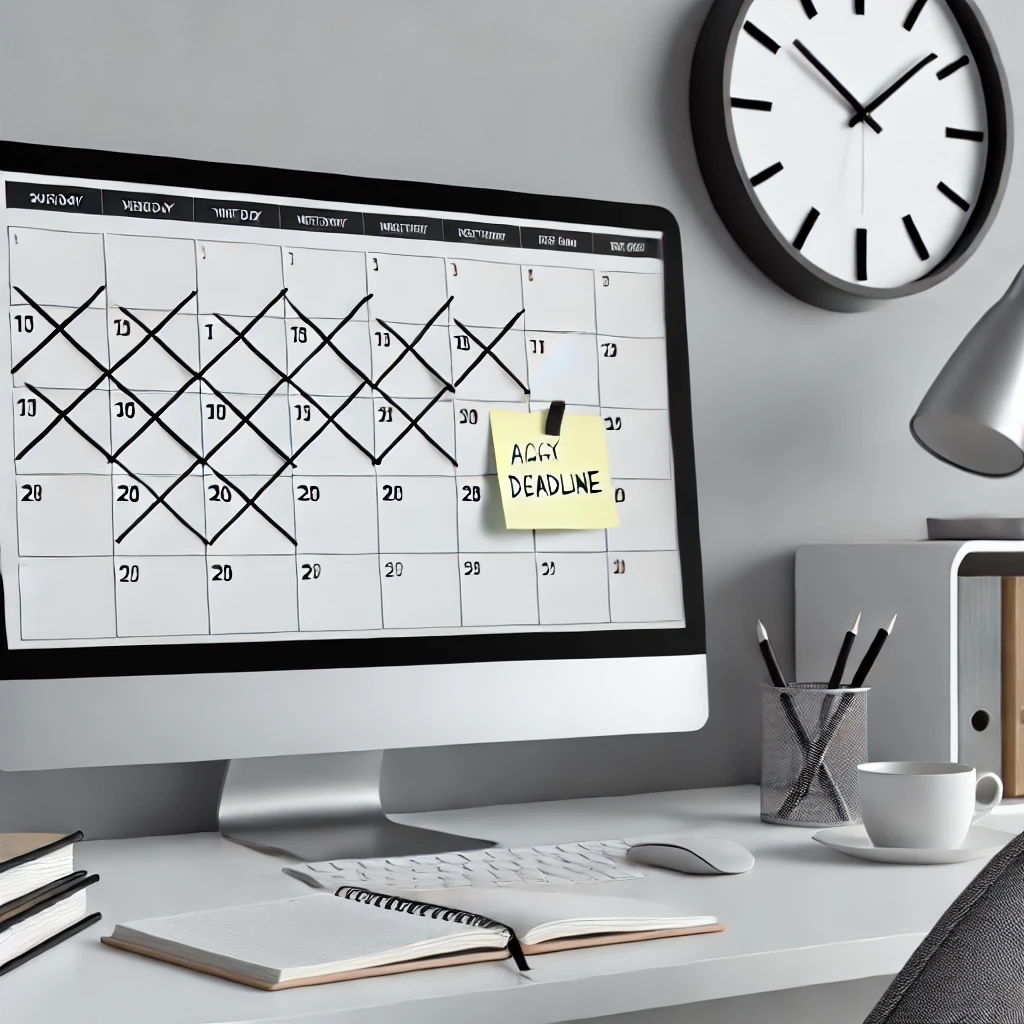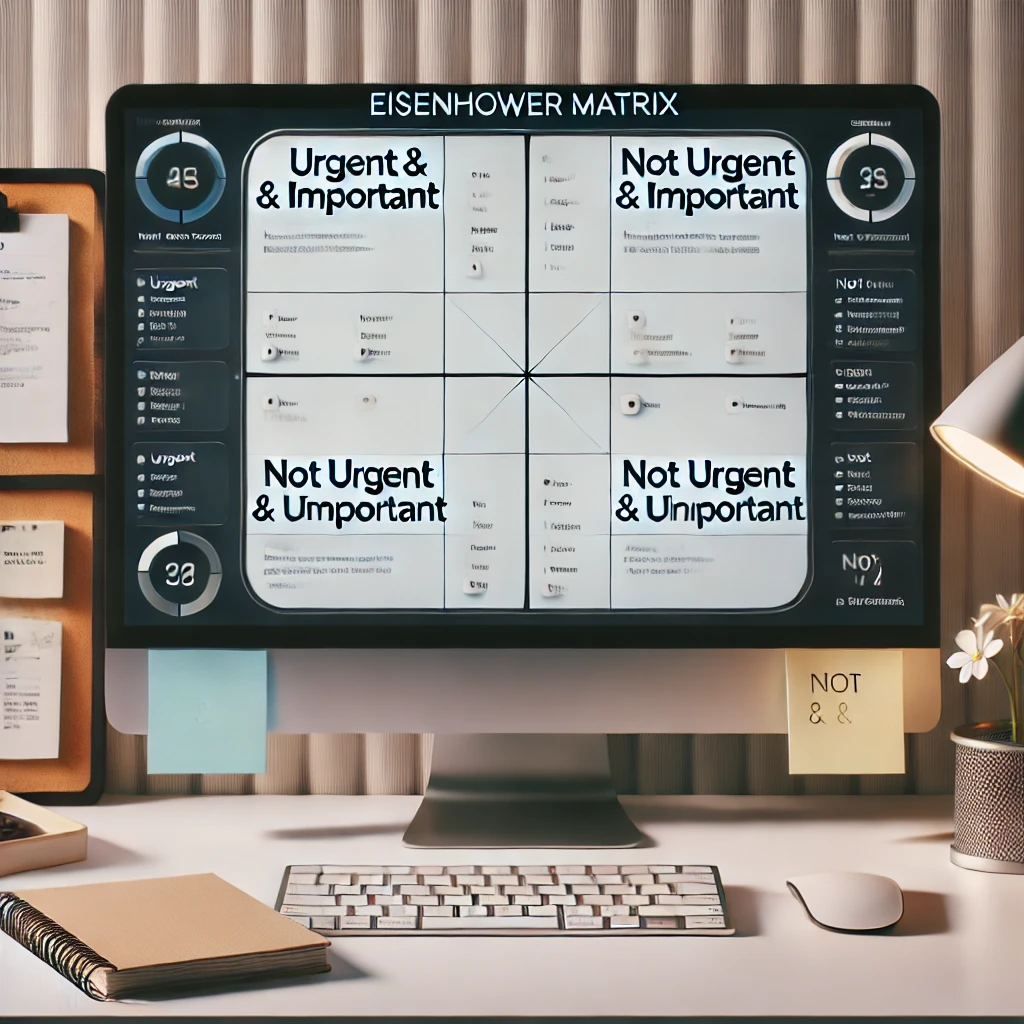The world is full of distractions. It can be hard to stay focused with social media and family needs all around us. But, we can get better at managing our time. By learning certain time management tricks, we can get more done each day. These tips are key for success in our busy lives. They can help us feel more focused and accomplished, even when things get loud around us.

Many people find it tough to stay motivated at work. A big part of this challenge is keeping our focus. Yet, using good time management can make a huge difference. When employees use tools to automate tasks, like Slack and Google Calendar, they often do better than expected. These tools are great for making work easier and more efficient. Plus, Slack’s App Directory offers over 2,600 apps to help with work and lower stress.
Define Your Purpose and Goals
Finding success starts with knowing your goals and purpose. It’s key to have a clear goal setting process. This helps you figure out what you want in life.
Think about your personal vision. This can help you match what you do every day with your big dreams. It keeps you productive and cuts down on things that distract you.

Breaking big goals into small steps can make it easier to move forward. This step-by-step way of working helps keep you going. You can see how you’re getting closer to your dream. And, it makes you work harder. Your personal dreams are a great motivator. They remind you why you’re working so hard.
Setting goals is not just about dreaming. It’s also about making plans to get there. This can improve how you use your time. It makes you work more efficiently.
Try giving yourself deadlines. This keeps you moving and stops you from waiting too long to finish. Understanding your goals helps you know what to do first. It helps you focus on what will really help you succeed.
Good time management and knowing what’s most important are huge for today’s jobs. Knowing your purpose helps you plan your time well. This way, you can reach success faster. It also makes you feel good about what you do, both at work and in your personal life.
Combat Procrastination Effectively
Procrastination is a big block to getting things done. Just a few steps can help you fight it. Students, especially, need to manage their time well with so many things to do. With the right strategies, you can stay focused, stop putting things off, and finish your work on time.
Use the Pomodoro Technique
The Pomodoro Technique is a great way to get stuff done. You work for 25 minutes, then take a 5-minute break. It helps you stay focused and makes big tasks seem less scary. This technique is a game-changer for many. It helps fight procrastination and organizes your time better. Check out more focus tips here.
Avoid Putting Off Boring Tasks
Do boring tasks first. It stops them from piling up and slowing you down. It’s easy to avoid tasks you don’t like, but doing them early helps. It makes room for fun work and boosts your efficiency. Learn how to tackle boring jobs better.
Tackle the Hardest Tasks First
Start with the hard tasks and your day will be smoother. This is called “eating the frog.” It helps you be more productive and keep going strong. When you face the tough stuff first, you set the pace for a great day. Learn how to do it effectively.
Eliminate or Minimize Interruptions
Interruptions can really slow us down and cost a lot of time to refocus. Making your space free of distractions is key to working well. Turn off digital alerts and set up a workspace that cuts down on outside noise. This small change makes it easier to really dive into your work.

Keeping track of interruptions with a log can show you what’s getting in your way. It helps to decide if an interruption is important or not. Planning regular catch-up times for less urgent matters can help keep your work time calm and focused.
Saying “no” to things that can wait is really important. It’s all about understanding what you need and changing the way you approach work. Using tools like “do not disturb” can really make a difference. This way, you can get more work done without being interrupted.
If an interruption happens, take a moment to gather your thoughts. Start again with something simple to get back on track. Creating gaps between tasks also helps you feel more in control of your day. Companies like BetterUp can guide you in making plans that suit your needs, improving how you handle distractions and boosting your work output.
Stop Multitasking
Multitasking is seen as a way to get more done. Yet, Stanford University found doing one thing at a time is better. Trying to do many things at once can hurt how well you think and make more mistakes.

Only a small number of drivers are good at multitasking, just 2.5%. Single-tasking helps more than multitasking. It cuts out distractions and means you do better work faster.
Single-tasking makes us think better because we don’t jump between tasks as much. It’s a key skill now because the world is full of stress and people say we should do a million things at once. Experts think picking just a few tasks each day makes us work better and focus more.
Doing many things in the media makes us less smart by 5-15%. This is because our brain gets tired from jumping around. For people and companies to be their best, they should stop trying to do too much at once. This makes work focused and quick.
To be more productive, we should avoid things that distract us. Plan what we need to do before starting. This way, we can do our work faster and better. In the end, doing one thing at a time makes us smarter and improves our work in general.
For more reasons why multitasking isn’t great for productivity, check out this detailed article.
Set and Stick to Deadlines
Setting deadlines is key to managing time well. It stops us from putting things off and helps us finish tasks on time. This makes us less stressed and more productive. It helps us keep focused on what we need to do.
Following deadlines well also helps us balance work and life. When we finish our work on time, we have more free time and less stress. This means we can be more energetic and focus on other things we enjoy. It improves our overall performance and profit as well.

One big issue we face with time management is not planning well. When we don’t have a clear plan, we often procrastinate and miss our goals. A good way to tackle this is by making a to-do list and breaking tasks into smaller parts. This approach fights off stress and keeps us organized.
Setting SMART goals is very important in this process. SMART goals are Specific, Measurable, Achievable, Relevant, and Time-bound. They help us stay on track and be more efficient. We should also check our time use often, to see if we need to adjust our plans.
In conclusion, sticking to deadlines is key to preventing procrastination and improving productivity. It helps us lead a well-organized life. By setting and following time-bound goals, we can achieve more in our personal and work lives. This leads to greater satisfaction with what we do.
Prioritize Tasks with the Eisenhower Matrix
The Eisenhower Matrix is a great tool for deciding what to do first. It helps people manage their time better and make smarter choices. It divides tasks into four groups: Do, Defer, Delegate, and Delete. This is based on how urgent and important they are. It makes working more efficient and improves how much you get done.
Do: Tasks that are Important and Urgent
Some tasks are both super important and need to be done right away. To avoid big problems, these tasks must be handled first. Doing these tackles critical deadlines and solves major problems fast. It also makes your decisions better and stops big setbacks.
Defer: Tasks that are Important but Not Urgent
Some jobs are key for the future but can wait for now. Tackling them later allows for better planning and self-improvement. This way, you can fit them in your schedule wisely, helping you move towards your big goals step by step.
Delegate: Tasks that are Urgent but Not Important
There are things that are not too important but need to be done quickly. These can sometimes be handled by someone else. Passing these tasks to others makes more time for what really matters. It makes managing your workload easier and picks out what’s truly important.
Delete: Tasks that are Neither Important nor Urgent
Some tasks are just not that important or needed right away. They mostly just take up your time or resources. It’s best to reduce or get rid of these tasks. This way, you can give more focus to important things. It helps you balance work and life better and feels less stressed.
Implement the “Eat the Frog” Technique
The “Eat the Frog” method means starting your day with the hardest tasks. It is shown that working on these tough tasks can boost your happiness and work focus. Early mornings are a great time to do this. Your energy levels are high, and your mind’s ready for challenges. Doing the big tasks first makes your whole day feel more successful.

Identify High-Impact Tasks
In the “Eat the Frog” method, find tasks that make a big difference. These could be things like coding or coming up with new ideas. This kind of work is very important now. The CEO of Doist says doing one major task a day leads to real progress.
Rank Tasks by Importance and Difficulty
Once you’ve found the big tasks, put them in order of importance and how hard they are. Tackle the toughest ones first. This simple step can make choosing what to do easier and stop you from delaying. Thinking about the big tasks the night before can help overcome mental blocks and sharpen your focus. Giving the hardest tasks your best effort at the start of the day ensures your day is a success. This makes you feel more satisfied and productive.
Utilize Time Tracking Tools
Using time tracking software is key for better work and spotting when you stall. This software helps keep track of time on tasks. It shows where you spend most time and how to adjust. A study found managing time well can make workers 25% more productive. Also, 82% say it helps lower their stress. Having good time skills boosts how much work gets done. Plus, it helps workers have a better life outside the job.
Advantages of Time Tracking
Time tracking software brings many good points to the table. It looks deeply into what’s slowing work down. This can help improve how work is done. When teams use time wisely, they can do more. This is without pushing too hard. Plus, they get better results and meet goals more calmly.
Popular Time Tracking Tools
There are plenty of great tools for time tracking. Toggl Track is known for ease of use and detailed stats. Clockify is a free app great for keeping a task log. Hubstaff not only tracks time but also checks on how much work a team has. For big projects, Asana and Notion are great for keeping all team tasks in one place. These help everyone work together smoothly. Hiveage helps with money, tracking time for billing and payments. And, for really big groups, Accelo can handle a lot of the client management work.
Seperate Your Urgent and Important Tasks
It’s important to know which tasks are urgent and which are important. Stephen Covey made the Eisenhower Matrix famous 30 years ago. This matrix puts tasks in four groups: Urgent & Important, Not Urgent & Important, Urgent & Unimportant, and Not Urgent & Unimportant. It helps us focus on important tasks while handling urgent ones.

Research from The Journal of Consumer Research found something interesting. People often do tasks that need quick attention instead of the big important ones. They call it the “Mere-Urgency Effect.” This makes task management hard. Especially for those who see themselves as very busy. They end up working on tasks that don’t really benefit them in the long run.
When people think about what their choices mean, they often pick important tasks over the very urgent ones. Covey’s Matrix from “The 7 Habits of Highly Effective People” helps with this. It shows tasks in four groups. Tasks in Quadrant 1 need action now. Those in Quadrant 2 are important for the future. Tasks in Quadrant 3 can be given to others. Quadrant 4 has tasks that need to go away.
About 60% of work time is usually spent on getting organized and checking on things. This means we need to get better at knowing what’s really important. Using colors to show the priority of each task can help everyone see clearly. Make sure there are only a few tasks in each category to prevent being overwhelmed.
Putting personal and professional tasks in separate Eisenhower Matrices helps. It shows what’s truly important. When we get rid of tasks that don’t add value, and then select important ones, everything gets easier. We make better choices and reach our goals faster.
Prioritize Productivity and Time Management for the Overwhelmed
In the dental industry, it’s easy to feel overwhelmed by tasks. A structured approach helps. It should include realistic planning and setting achievable goals.
Create a Realistic To-Do List
Start by making a realistic to-do list. Group tasks as Boulders, Big Rocks, and Pebbles. Boulders are the must-do tasks, Big Rocks are important but can wait a bit, and Pebbles are small tasks.
This method helps you focus on the big things. It makes sure small tasks don’t slow you down.
Avoid Constant Email Checking
Keeping email in check boosts your productivity. Limit checking it to just a few times a day. Less email means fewer distractions. It lets you focus on what’s important without interruption.
This way, Dental Office Managers can work more smoothly. They’re less likely to make mistakes because they aren’t constantly checking emails. Instead, they focus on their big tasks.
Review Your Progress Daily
It’s important to look at what you’ve done each day. This daily check helps you find areas to improve. And it keeps you going. You can see what you’ve done well and adjust where needed.
This habit helps keep you on track. It’s a way to deal with a lot of work without feeling overwhelmed. It’s all about staying focused and effective.
By following these tips, any dental office can manage time better and get more done. Tasks can be shared with others. Plus, having times set out for certain types of work, like answering emails, helps. Checklists can make a big difference, too.
Conclusion
Using the tips for boosting productivity and mastering time can really make a difference. It’s about more than doing tasks well. It’s also about reaching goals for satisfaction and peace.
First, set goals you can actually achieve with the SMART method. Then, manage tasks better and use tools like calendars and Kumospace. These actions improve how you manage time, increase your productivity, help with work-life balance, and keep your mind positive.
Keep at it and you’ll beat problems like waiting too long to start or not planning enough time. With these strategies, get ready for big changes. Start now, and see how you can achieve more and feel calmer.
FAQ
What is the foundation of exceptional time management?
The foundation for great time management is setting clear goals. It’s about knowing what you want from life. Knowing what inspires you helps you focus on the right tasks.
How can goal setting improve productivity?
Setting goals gives you a direction. It helps you focus on the tasks that really matter. This can boost your productivity and lead you to success.
How does the Pomodoro Technique help in combating procrastination?
The Pomodoro Technique is all about working in short bursts. You then take small breaks. This way, you stay focused and beat procrastination.
Why should I avoid multitasking to increase productivity?
In simple terms, multitasking makes tasks take longer and lowers their quality. Doing one thing at a time means you put all your effort into it. This leads to better results.
What strategies can help minimize interruptions?
Turn off digital alerts and choose a quiet place to work. This helps you keep your focus. It can really boost your productivity.
How important is setting and sticking to deadlines?
Deadlines are key in stopping procrastination. They make sure tasks get done on time. Being disciplined with deadlines is vital for good time management.
What is the “Eat the Frog” technique, and how does it improve productivity?
The “Eat the Frog” method means starting with the toughest task of your day. Getting it done first smooths out the rest of your day. This can improve how productive you are.
How does the Eisenhower Matrix optimize task prioritization?
The Eisenhower Matrix puts tasks into four groups based on their importance and urgency. This method helps you tackle the most critical things first. It guides you on what to schedule, delegate, and remove, improving how you use your time.
What are the benefits of using time tracking tools?
These tools show you exactly how you spend your time. They let you see where you can make changes. This helps you work better and smarter.
Why is distinguishing between urgent and important tasks crucial?
Knowing what tasks are urgent or important helps you organize your time. It makes sure that you focus on what really matters. This is how you get things done well.
How can creating a realistic to-do list help in managing time better?
A good to-do list helps you see what needs to be done. It helps you focus on important tasks. This way, you can avoid taking on too much and stay focused.
Why should you avoid constant email checking?
Checking emails too often is a big distraction. It interrupts your work. Limiting this to set times helps you concentrate better on important tasks.
How does reviewing daily progress enhance productivity?
Looking at what you’ve achieved each day keeps you motivated. It helps you continue making progress. This is key in staying productive and reaching your goals.

More Posts
30 Essential Time Management Strategies for Efficiency
Use these time management strategies to hack your time and become more efficient! Time is your most valuable currency. If you’re not careful, hours, days, weeks, months, and years can sneak right by...
Top strategies for Improving Business Productivity
A successful business achieves maximum profit with minimum resource investment. Business owners understand that maximizing productivity is the best way to accomplish this goal. Workforce, workplace environment, culture, and routines influence business performance....
11 Essential Elements of a Successful Partnership Meeting
A successful partnership meeting is a key strategic tool that enhances collaboration, drives decision-making, and reinforces shared objectives. In today's fast-paced professional environment, Zippia research indicates that an average worker spends 31 hours...
8 Ways to Deal with Writing Procrastination
Many writers struggle with putting off their work. This problem hits even the most disciplined writers. It comes from things like wanting to be perfect, feeling guilty, and being anxious. There are many...